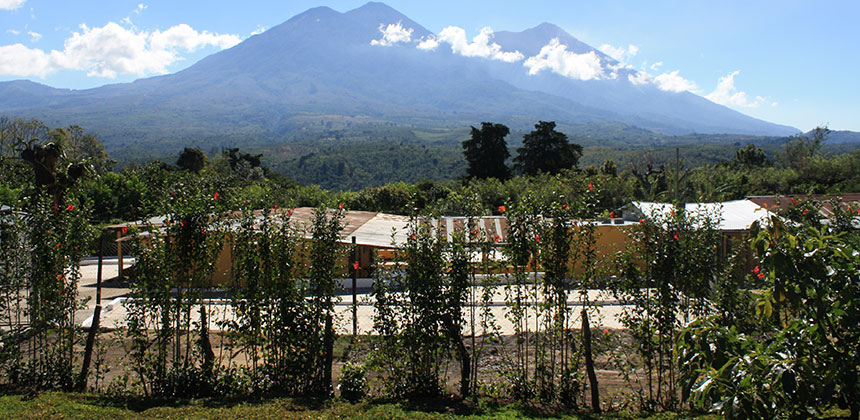Our restaurant is closed, Updates to follow.
ABOUT OUR COFFEE
Featured Revolving Origins
 The idea was born in Santa Amellia Xalapa as a way of supporting a growing community of farmers. They excelled at growing: Corn, Tomato, Apples, Peaches and Avocado - they then added coffee.
The idea was born in Santa Amellia Xalapa as a way of supporting a growing community of farmers. They excelled at growing: Corn, Tomato, Apples, Peaches and Avocado - they then added coffee.Due to the richness of the soils and the high altitude at where they are found, coffee has been a great success. The idea originated when a Spanish organization visited them and encouraged an organized community to support each other and find better markets for their quality products. They became a formal association in February of 2017 with the help of PrimaVera and will hopefully have their first wet mill next year.
Association: Small Producers Jalapa
Legal representative: Pataleon Lopez
Region: Jalapa
Varietal: Pache San Ramon, Catuai, Bourbon, Caturra
Processing at Farm: Fully washed, fermented and sun dried at Finca El Hato, Fraijanes
Coffee produced: 250,000 kg (avg. Year)
Elevation: 1,700 – 1,900 mts
Rainfall: 1,500 - 2,500 ml
Temperature: 12 – 26ºC
Water Supply: Water dams with rainwater only – there are very little water resources in this region, one of the main reasons no one has access to a wet mill.
Soil: Pumis soils, black rich soil
Shade Trees: Chalum, Caspirol, Graviela, banana trees
Members: 46 members in the association, 3 of which are women
Town/City: Indigenous community of Santa Maria Xalapan Jalapa, Jalapa
Age of the coffee trees: The coffee plantations are roughly 15 years old and are pruned and renewed on a regular basis in order to produce quality coffee.
 The Muungano cooperative is located over three hours south of Goma, on a questionable dirt road on the Western shore of Lake Kivu. The closest town is Minova, which is a ramshackle and bustling hamlet, trafficking largely in manioc, fish, and "road taxes." And though I did not feel that my tax dollars were being put to very good use as we banged over rocks and wallowed through muddy troughs, the visit to Muungano was totally worth the drive.
The Muungano cooperative is located over three hours south of Goma, on a questionable dirt road on the Western shore of Lake Kivu. The closest town is Minova, which is a ramshackle and bustling hamlet, trafficking largely in manioc, fish, and "road taxes." And though I did not feel that my tax dollars were being put to very good use as we banged over rocks and wallowed through muddy troughs, the visit to Muungano was totally worth the drive. Founded in 2009, Muungano coop is comprised of around 4,400 smallholder farmers, nearly half of them women. Gender justice is a principal focus of the members, as is integrating farmers from different ethnic groups into the operation. The word "Muungano" actually means "Togetherness" in the Swahili language. When we first visited the group, they were milling coffee on equipment from the early twentieth century, but still managed to produce the best Congo coffee we had ever tasted. Since then, they have installed two new washing stations, a new cupping lab and have a trained roaster and cupper on staff. The fruits of their hard work are evident in the sweet, bright, and complex coffees they produce every year.
Despite the many challenges faced by coffee producers in the DRC, the co-op members are remarkably focused, professional, and upbeat. Our friends at Twin, who first partnered with the cooperative and did a lot of training with the producers, have done a phenomenal job of helping growers get the most out of the ancient Bourbon coffee trees growing in the region.
Muungano cooperative members are remarkable for their eagerness to learn what they could do to deepen our commercial relationship improve the quality of their production. A visit to Muungano is a great reminder of how hard our growers work to produce their coffee - often with incredibly limited infrastructure, and in very difficult circumstances. Atlas is extremely proud to be one of the very first importers in North America to offer this exceptional coffee. In 2017, Muungano also obtained their Organic certification, opening new doors to sustainable specialty coffee markets.
Region: South Kivu
Altitude: 1,480 – 2,000 mts
Harvest Period: Feb - Jun (main), Sep - Dec (fly)
Standard Export Prep: FW Scr. 15+
Municipality: Kiniezire
Genetic Varieties: Mainly Bourbon
Certification: Fair Trade, Organic
Producer Type: Cooperative
Processing Method: Washing at centralized Washing stations
Annual Production Quantity: Up to 6 containers
FLO ID: 29699
Number of Members: 4,355
Drying Method Raised Beds



